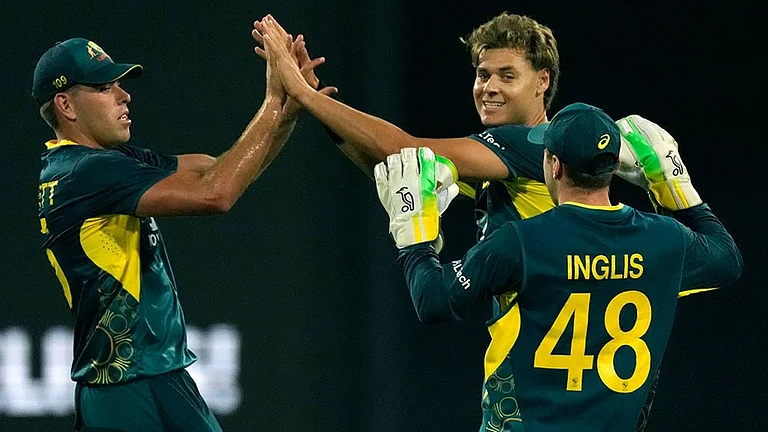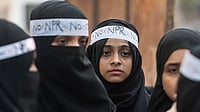Holding a mashaal (burning torch), the new symbol of the Uddhav Thackeray faction of the Shiv Sena, his party workers converged at the memorial of Balasaheb Thackeray in the iconic Shivaji Park in Dadar in central Mumbai. They lit the torch and set out on a new journey to take the mashaal to every home in Maharashtra. The new catchphrase of the Thackeray faction to be henceforth known as Shiv Sena Uddhav Balasaheb Thackeray is “har ghar mashaal (A torch in every household)”.
The rival Shiv Sena camp headed by incumbent Chief Minister Eknath Shinde, too, has a new name and a new symbol. To be known as Balasahebanchi Shiv Sena, their new symbol will be a shield with double swords (dhal–talwar). As the Election Commission of India handed out new names and symbols, there is a buoyancy in both factions.
Late night on October 8, the Election Commission, in its interim order that came as a shock to both factions, decided to freeze the bow and arrow symbol of the 56-year-old Shiv Sena after two factions staked claim to the name and symbol of the party.
This is not the first time the Shiv Sena has seen a change in the party symbol. After its formation in June 1966, the party contested the Thane Municipal Council polls a year later. Of the 40 candidates it had fielded, 21 were elected to the council. In 1968, the Shiv Sena contested the Brihanmumbai Municipal Corporation (BMC) polls in alliance with the Praja Samajwadi Party and won 42 seats, setting in motion its long march to occupy Mantralaya, the headquarters of the Maharashtra government. Since it had not been registered as a political party, it fought elections with various symbols including the sword and shield, rising sun and coconut tree, among others.
After a couple of elections—municipal, assembly and Lok Sabha—the party finally made a mark when 74 of its candidates won BMC elections. This led to the Election Commission recognising the Shiv Sena as a regional party on December 13, 1989, while awarding it the symbol of bow and arrow. Thirty-three years after the party got the election symbol, the rebellion within its ranks took it away.

While both factions claim victory with their new symbols, the Thackeray faction feels that the mashaal symbol has an upper hand as it is with this symbol that the party came to rule at the BMC. “It will burn away all the evil and a new energy will be born in the party. The mashaal will reach every home and we will be victorious,” says Kishori Pednekar, former mayor of Mumbai.
The Shinde faction, on the other hand, claims that their new symbol represents the aspirations of the Marathi manoos (sons of the soil), while the name of the rival faction Shiv Sena Uddhav Balasaheb Thackeray represents the aspirations of Uddhav and his son Aaditya. “The name itself indicates that it is Uddhav’s Sena and not the one founded by Balasaheb,” says Bharat Gogowale, chief whip of the Shinde faction.
Meanwhile, the Election Commission has frozen the bow and arrow symbol till such time as it determines which of the two factions should be recognized as the “real” Shiv Sena. Neither faction can use the party name Shiv Sena or the symbol. However, the freezing of the symbol connected with Balasaheb Thackeray has angered the Shiv Sainiks across the rank and file. Their reaction—anger, sadness and disillusionment at the loss of the party symbol—reiterates the fact that the Shiv Sena is an emotion first and a political party later. Though Shinde’s rebellion was based on the premise that the Shiv Sena led by Uddhav had strayed from the ideology of its founder, the anger of the common Shiv Sainiks reflects none of it today. It is directed more at the BJP, the alliance partner in the coalition government led by Shinde. “It looks like the BJP’s game plan to finish the Shiv Sena is slowly unrolling,” says Manoj Gadekar, a Shiv Sainik who has been with the party for over three decades.
The urgency of the interim order was necessitated due to the upcoming bypoll in the Andheri East assembly constituency. Both factions will be known by the names they choose which, if they so wish, can be linked to the name of the parent party Shiv Sena. Each faction will be allotted different symbols, which they may choose from the list of free symbols notified by the Election Commission for the purpose of the bypoll. Earlier, a similar interim arrangement was ordered in the case of the AIADMK and the Lok Janshakti Party.
According to sources, the anger of the past months against Thackeray is slowly ebbing and sympathy is piling up, a fact not lost on Shinde. Speaking to Outlook, Shiv Sainiks across the divide felt that the Shiv Sena will lose its numero uno position in the state due to the rebellion. “This fight is not good for the Shiv Sena. It is already destroying the Shiv Sena,” says Pandharinath Sawant, one of the founder members of the party. “The Marathi manoos is left far behind. If these people had cared about the Marathi manoos, they would not have set out to destroy the Shiv Sena,” adds an angry Sawant. According to him, a true Shiv Sainik does not hanker after position in the party. For every one traitor, there are hundreds of Shiv Sainiks who are there because of an emotional attachment with the Shiv Sena.
Rani Mahamule, a homemaker, who has been a Shiv Sena worker since a decade, equates the party with a ‘mother’ . “Taking away of the party symbol was like taking away a child from its mother,” says Mahamule. For her, the Shiv Sena has been a teacher, something that has motivated her to step out of the house and help others. “Today, I feel sad that my party is breaking up. Shiv Sena is like a mother who has given me so much. I am a Shiv Sainik and like everyone else I will defend the dignity of my party,” she adds categorically.
Speaking to Outlook, Shiv Sena researcher and political commentator Sanjay Patil felt that the original Shiv Sena is finished. “The larger picture is that the BJP orchestrated the fall of the original Shiv Sena. Both these factions will never come together. So, the Shiv Sena is effectively done away with,” says Patil. He adds, “It is not easy for Uddhav Thackeray to come back and occupy the original political space the Shiv Sena once had, but this is not impossible.” Thackeray’s accommodative and inclusive politics has found him new support from those who were not traditional supporters of the Shiv Sena. It is also difficult for the Shinde faction to get re-elected.
While Uddhav is defending the political legacy of his father, Shinde is appropriating the same. For the common Shiv Sainik at the grassroots, however, it is a fight to defend a party on the brink of collapse.
(This appeared in the print edition as "Locking Horns")


























